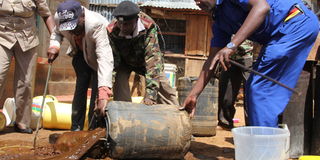How illicit brewers in Central region conspire to evade crackdown

Security officers destroy some of the kangara seized from illicit liquor brewers during a raid at Likii Estate in Nanyuki Town in a past event. Illicit brew dealers have devised new ways to evade arrest following government crackdown.
Illegal brewers, their customers and some security personnel have devised new ways of thwarting a crackdown led by Deputy President Rigathi Gachagua.
According to a May 18 intelligence report by the National Government Administration Officers, the new tricks include faking funeral, wedding and medical bill fundraising events where the brews are served. Alcohol is also being sold in churchyards, cemeteries, garages and lodgings.
"Fake gatherings in social halls and hotels have become commonplace, where brews we have ordered removed from the shelves are sold, and bar owners lock up other customers in lodgings or private homes to keep the business going," the report says.
The report adds that some of the security officers, whom Mr Gachagua has deployed to fight the killer brews and their unscrupulous peddlers, are taking bribes to look the other way.
"The conspiracy is that the customer is made to pay more per pint in order to generate enough money for profits and bribes for the corrupt officers," he adds.
Security officials
The crackdown is further complicated by the involvement of some politicians, security officials and influential businessmen.
In Murang'a County, intelligence reports indicate that a prominent MCA distributes banned liquor brands and also owns a retail outlet, while at least 10 other politicians and dozens of security officers own liquor outlets.
This has prompted the Central Regional Commissioner, Fredrick Shisia, to issue a terse warning to county commissioners that "all those areas that are found not to be taking this government directive on combating illicit brews and narcotics with the seriousness it deserves will face drastic action".
Governors Anne Waiguru (Kirinyaga), Mutahi Kahiga (Nyeri), Irungu Kang'ata (Murang'a), Kiarie Badilisha (Nyandarua) and Kimani Wamatangi (Kiambu) have also been tasked with reducing the number of bars in the region from the current 15,432 to less than 6,000.
Mr Gachagua has since warned that 'we will confront the nonsense of governors who issue licences anyway for profit, as well as... some judicial officers who are lenient with those arrested'.
In Murang'a, Dr Kang'ata has already begun the task, rejecting new licence applications while ongoing inspections have excluded half of the bars from obtaining liquor licences.
Another trick is to package illegal brews in mineral water bottles and thermos flasks, which are then sold on the streets as police concentrate on bars and liquor dens.
An incident on April 26, when 20 revelers were arrested for consuming alcohol in Kenol town's eateries in Murang'a South, illustrates the creativity the industry is unleashing to counter the crackdown.
Murang'a South deputy county commissioner Gitonga Murungi said: "This is a tricky war, but we will remain vigilant and we will overcome it.
Bar owners
In Maragua town, Nation.Africa witnessed workers hired by bar owners peel off the labels of banned brands from bottles and affix those of certified brands instead.
The other trick witnessed in Karatina town was the illegal brews being packaged in sealed buckets and sold in beer bottles.
"Mr Gachagua does not know what he is up against in this war. This is an industry that has made many uniformed government officers millionaires and the network of protection we enjoy is immense," said a bar owner in Karatina.

Police in Murang'a South check illicit brews confiscated in Maica Ma Thi village in a past crackdown.
Announcing the crackdown in Nyandarua, Kiambu, Murang'a, Kirinyaga and Nyeri counties a month ago, Mr Gachagua said the killer brews and narcotics in the region were "the equivalent of our early World War III".
After announcing the crackdown on Inooro TV a month ago, the DP held high-profile meetings with leaders and security officials, telling them that President William Ruto was acting as a patron in the war on illegal alcoholic drinks.
"We are targeting the illegal brewers who must be put out of business, drug dealers of all hues who must vacate the market, wines and spirits that must be shut down, bars that must be reduced, ethanol dealers that must be stopped and all saboteurs that must be defeated," he said.
In towns visited by Nation.Africa, including Karatina in Nyeri, Ngurubani in Kirinyaga, Njabini in Nyandarua, Thika in Kiambu and Maragua in Murang'a, illegal brewers have resorted to selling their wares openly from 3am until 8am when police patrols begin.
Those who have paid bribes operate after 11pm and close at 8am. Most bar owners reported that the police now demand Sh300 per day instead of the previous Sh500 per week and Sh100 per day.
Maragua MP Mary wa Maua has since revealed that some bar owners, known for selling illicit liquor in their establishments, are corrupting the renewal of licences by bribing the vetting committees.
"In Maragua, we were forced to cancel the vetting after it was discovered that bribes had prevailed. We have restarted the exercise and have since warned our security officers not to engage in monkey business," she said.
The pioneer director of the National Agency for the Campaign Against Drug and Alcohol Abuse (Nacada) when it was established in 2001, Mr Joseph Kaguthi, told Nation.Africa on Monday that "this time we must win this war".
Mr Kaguthi added that devolution has also opened up another front that is sabotaging the war against killer brews and narcotics "as governors, in their efforts to raise county capital, have started licensing all sorts of liquor distilleries and outlets, littering the region with dens that operate boldly and with total impunity".





